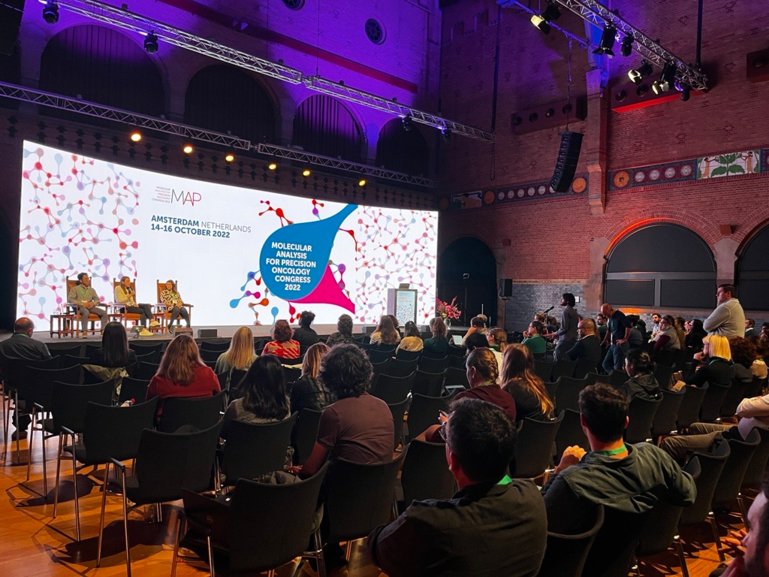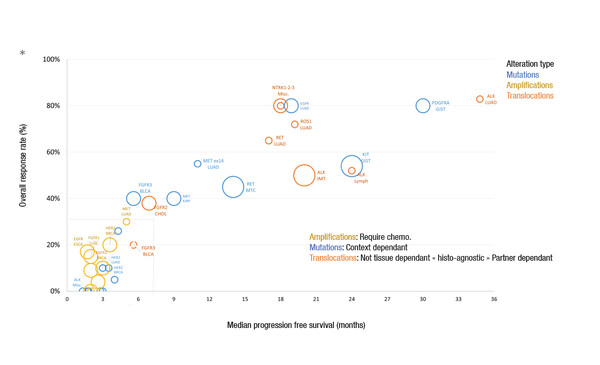Data from a molecular analysis of receptor tyrosine kinase-mutated cancers show a wide heterogeneity of alterations and response to tyrosine kinase inhibitor monotherapy
A comprehensive picture of the landscape of receptor tyrosine kinases (RTKs) targetability was presented at the Molecular Analysis for Precision Oncology (MAP) Congress 2022, adding further knowledge on the use of tyrosine kinase inhibitor (TKI) monotherapy across cancer types (Abstract 6MO).
The analysis of 16 selected RTKs led by a research group at the Centre Léon Bérard, Lyon, France, showed that clinical efficacy with the best TKI was strong in patients with RTK translocations, variable in patients with missense mutations and weak in patients with amplifications. There was wide heterogeneity of targetable RTK alterations across cancer types and mutual exclusivity of drivers in baseline tumours was found for RTK translocations and mutations of EGFR with KIT and FGFR3, but not for amplifications.
Based on these results, the authors suggest that TKI monotherapy can be considered in tumours with RTK fusions with expressed partner and few other genetic alterations, and also in those with activating missense mutations in RTK involved in normal cell lineage physiology. However, antibody–drug conjugates (ADCs) or monoclonal antibodies (MAbs) plus chemotherapy may be preferred for tumours with RTK amplifications.
Dr Victor Moreno from START FJD, Madrid, Spain, thinks that wide heterogeneity seen in the presented research may help to explain the results of other studies. “For example, the WINTHER trial navigated patients to therapy on the basis of fresh biopsy-derived DNA sequencing or RNA expression (Nat Med. 2019;25:751–758). Although 107 out of 303 patients received a recommended treatment based on their mutational profile – a seemingly large proportion – the objective response rate was only 11% and this may be due to the fact that the alterations used to select the targeted therapy were very broad and thus inefficient.”
The French study used pan-cancer public databases (MSK-IMPACT / MSK-MET) and in-house sequencing data (including from the PROFILER and PROFILER 02 trials) to look at the molecular landscape of cancers with alterations in EGFR, HER2, PDGFRA, KIT, FLT3, NTRK1-2-3, ROS1, ALK, RET, MET and FGFR1-2-3-4. Clinical efficacy of TKIs, MAbs and ADCs was also investigated via a systematic review of phase I–III studies published, with efficacy being defined as an objective response rate of 30% and/or a median progression free survival of >6 months.
“Although the incidence of real alterations that will confer a good clinical benefit was very low, next-generation sequencing (NGS) is still warranted,” notes Moreno. “For example, even if translocations occur in only 1 in 1,000 patients, that one patient has a 100% chance of response and clinical benefit, so it is worth looking. And mutations may only appear in 3% of patients, but with response rates above 60%, the benefits are high for these select few.” He thinks that the cost-effectiveness of NGS will increase as prices drop, and also emphasises that the benefits of NGS extend beyond those demonstrated by this study, such as potential entry into clinical trials with new targeted agents.
Moreno highlights the need to improve treatment of tumours with RTK amplifications, where clinical benefit was found to be weak: “It is clear that targeted therapy with single-agent drugs is not enough for amplifications. We are seeing encouraging responses with different ADCs even in the presence of low receptor expression, thanks to their bystander effect, so this is a very interesting proposition,” he concludes.
Abstract discussed:
Vanacker H, et al. Pan-cancer characterization of receptor tyrosine kinases alterations to sort targetable drivers from passengers. MAP 2022, Abstract 6MO
Mini Oral Session 16.10.22, h. 15:40 – 16:40, Auditorium
Watch the session on demand on the Congress virtual platform


